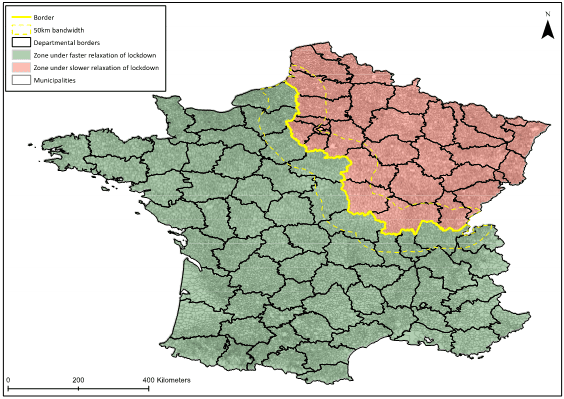#EconomicPolicy
#EconomicPolicy74
Lockdown and Voting Behaviour during the Pandemic
Evidence from French local elections
Parts of France under more stringent lockdown restrictions in the spring of 2020 had patterns of voting behaviour and electoral outcomes that were significantly different from those in places with softer measures. According to new research by Tommaso Giommoni and Gabriel Loumeau, a larger proportion of voters turned out in hard lockdown municipalities, and they gave more support to the incumbent politicians.
The study suggests that far from voters being discouraged from participating in fear of the disease, being subject to a longer lockdown mobilised them to choose the right leader. This may be due to perceptions that political institutions are crucial in the management of the health crisis, but also to a desire to once again be involved in the decision process, following a temporary suspension of individual liberties.
Overall, these findings suggest that voters are likely to rally around their incumbent politicians during the toughest moments of a crisis. This may increase political stability as well as loyalty towards political institutions.
More…
Covid-19 led governments to face a global health crisis that threatens the life of millions of people in the world and has seriously undermined economic development. A common reaction to the pandemic has been the implementation of a set of social containment measures known as lockdown with the goal of limiting the spread of the disease. Given the unprecedented nature of this challenge, it appears crucial to understand how voters react to the introduction of lockdown policies.
The new research studies the causal, short-term effects of lockdown measures on voting behaviour. The authors rely on a natural experiment that took place in France during the Covid-19 outbreak, which saw the implementation of a differential lockdown across French departments and the delay of the second round of municipal elections.
Lockdown and local elections in France
Similarly to the other European countries, France was severely affected by the pandemic with 1,250,705 confirmed COVID-19 cases and 47,637 total casualties, by the end of October 2020. The French government introduced the lockdown before the surge of the pandemic, on 17 March.
After the pandemic reached the contagion peak in April, the government decided to start loosening the restrictions, but the relaxation was not uniform across French departments. In particular, the French territory was divided into two areas, a green one and a red one, depending on the local severity of the pandemic.
Departments in the green zone experienced a faster relaxation –’soft’ lockdown– than those in the red zone –’hard’ lockdown (see Figure 1). This division remained effective from 11 May to 2 June.
The delay of the second round of the 2020 municipal elections, due to the pandemic, makes it possible to measure the voting behaviour of French voters immediately after the lockdown. The first round of the polls took place on 15 March, while the introduction of the lockdown two days after the elections impeded the conduct of the second round, which was delayed until the conclusion of the restrictions, on 28 June.
Main results
This institutional setting offers unique variation to estimate the causal effect of lockdown restrictions on electoral outcomes. The authors compare cities located across the border, and then subject to different rules, just before and just after the implementation of the lockdown.
The main results suggest that the severity of the lockdown significantly affects electoral outcomes and voting behaviour. First, localities subject to hard restrictions have significantly different voting patterns compared with those under soft measures. Municipalities in the red zone give more support to the local incumbent, whose vote share is between 2.5 and 6 percentage points higher.
Second, enforcement of the hard lockdown raises political participation, measured by a 1.5 to 5 percentage point increase in voter turnout. Being subject to a longer lockdown seems to mobilise voters, motivated to choose the right leader, rather than discouraging them from participating, in fear of the disease.
This renovated motivation toward political participation may be due to the perception that political institutions are crucial actors for the management of this health crisis but also to the desire to take part again to the decision process, after having suffered a temporary suspension of individual liberties.
Overall, these findings suggest that voters are likely to rally around their incumbent politicians during the hardest moment of the pandemic, and this may increase political stability as well as loyalty towards political institutions. These findings may have important consequences for policy-making in the aftermath of the crisis.
Figure 1: Differential lockdown from 11 May to 2 June 2020

‘Lockdown and voting behaviour: A natural experiment on postponed elections during the COVID-19 pandemic’
Authors:
Tommaso Giommoni (ETH Zurich)
Gabriel Loumeau (ETH Zurich)






